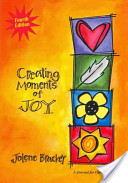June 26, 2014
Creating Moments of Joy
Creating Moments of Joy
A book review by Jonesboro Staff member – Valerie Fielder
 Communicating with a person affected by Alzheimer’s disease can often be difficult. Because the portion of the brain that retains short term memory is the first to be affected,they will often share the same story over and over again. Author Jolene Brackey has written an amazing book about dealing with this ever growing problem.
Communicating with a person affected by Alzheimer’s disease can often be difficult. Because the portion of the brain that retains short term memory is the first to be affected,they will often share the same story over and over again. Author Jolene Brackey has written an amazing book about dealing with this ever growing problem.
In this book, Jolene shares her vision that we should all look beyond the challenges of Alzheimer’s disease and focus more of our energy on creating moments of joy. “When a person has short-term memory loss, their life is made up of moments. But if you think about it, our memory is made up of moments, too. We are not able to create a perfectly wonderful day with someone who has dementia, but it is absolutely attainable to create a perfectly wonderful moment; a moment that puts a smile on their face, a twinkle in their eye, or triggers a memory. Five minutes later, they won’t remember what you did or said, but the feeling you left them with will linger”.
During a discussion about pets, Tom piped up about his pet mule. He said, “I had a pet mule once named Topsie. The only way to get Topsie to work for me was to share my tobacco with him.” I asked him how old he was, and he said, “I was about 15 or 16.” Tom is 82 years old, and doesn’t remember what he had for breakfast, but he still remembers details from his childhood. He not only remembered how old he was and the name of his mule, but he remembered how to get Topsie to work for him. Now that’s a treasure!
As a family caregiver for my mother who suffers from this horrific disease, I was truly inspired by her book that a co-worker lent me to read. I am also envious that she has had the pleasure of hearing Jolene Brackey speak in person. Click on this link to watch her in action – http://vimeo.com/28805059
In closing, I want to share another insight from Jolene:
People who have dementia need to have structure and routine every day, in order to get a better day.
“Let Go” To “let go” does not mean to stop caring;
it means I can’t do it for someone else.
To “let go” is not to cut myself off;
it’s the realization that I can’t control another.
To “let go” is to admit powerlessness,
which means the outcome is not in my hands.
To “let go” is not to try to change or blame another;
it’s to make the most of myself.
To “let go” is not to “care for,” but to “care about.”
To “let go” is not to judge,
but to allow another to be a human being.
To “let go” is not to deny, but to accept.
To “let go” is not to nag, scold, or argue, but instead to
search out my own shortcomings and correct them.
To “let go” is not to regret the past, but to grow and live
for the future.
To “let go” is to fear less and love more.